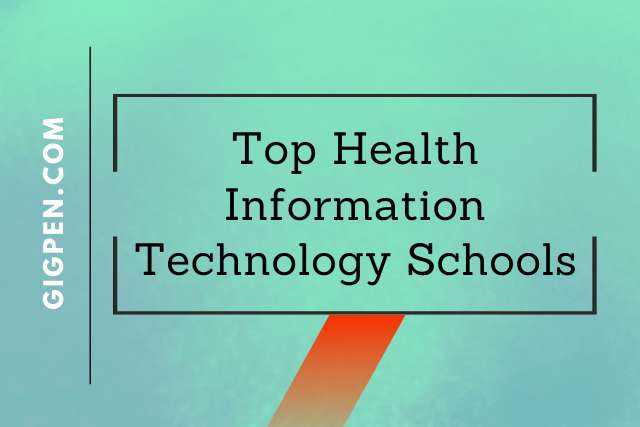University of California, Johns Hopkins University, and University of Michigan are the best schools for health information technology education. These institutions are the top because of their innovative curricula and connections with business, preparing graduates for exciting careers in healthcare technology. Also, health information technology schools are crucial in creating competent workers who can effortlessly combine technology and healthcare.
What are the Benefits Of Going to a Health Information Technology School?
Health information technology institutions are a means to connect the healthcare and technological worlds. They also prepare graduates with relevant skills to contribute to the evolving healthcare business, enhancing data security, and streamlining patient care.
7 benefits of going to a health information technology school:
1. Knowledge with a Focus
To provide a thorough understanding of the area, health information technology schools focus on electronic health records, medical data management, and healthcare IT systems.
2. Employment Opportunities
Due to the growing need for people who can manage and safeguard health-related data, graduates frequently find employment in various healthcare settings. Graduate from these schools can work in hospitals, clinics, insurance firms, and governmental organizations. They get to work for the best companies in technology.
3. Job security
The demand for qualified health information technology experts is rising due to the expansion of electronic health records and digital healthcare systems. This provides the sector with a stable labor market. Also, there are many jobs available in health information technology.
4. Competition in salary
Given the unique knowledge, the specialist abilities acquired from these institutions can result in increased earning potential compared to generic IT employment.
5. Improvement of healthcare quality
They provide accurate and accessible medical records. Additionally, efficient health information management improves patient care by assisting healthcare professionals in making knowledgeable decisions.
6. Technology development
Attending these institutions will put you at the forefront of healthcare technology developments and give you the flexibility you need to adapt to the continually changing environment of medical information systems.
7. Collaboration across disciplines
Health information technology specialists frequently foster cooperation between various healthcare industry segments when working closely with healthcare administrators, providers, and IT teams.
How Much Do Programs In Health Information Technology Cost?
An associate degree program costs $13,500, but a bachelor’s program often costs $36,000. There are a lot of cost-effective online degrees available as nicely, some of which start at just $4,500.
Top 10 Health Information Technology Schools
Schools for health information technology are essential for educating students about the interface between healthcare and technology.
Here are 15 health information technology schools:
1. University of California (UCSF)

Grade-point average: 88%
Rate of acceptance: 6%
Certification exams: 96%
Employment rate: 98%
Location: California, San Francisco
Tuition: $48,926
University of California in San Francisco is known for its research dedication and solid academic reputation. It offers a 2-3 years course on Master of Science in Health Informatics and a Master of Science in Biomedical Informatics.
It has 1,000 students and offers 60 credit hours. Transferring students must have a GPA of 3.0 or better and pass all necessary courses. The average SAT score for admitted students is 1520, and the average ACT score is 33. The school provides different financial aid alternatives, including loans, scholarships, and grants. They have accreditation from the Health Commission.
2. Johns Hopkins University
Grade-point average: 91%
Rate of acceptance: 10%
Certification exams: 98%
Employment rate: 99%
Location: Baltimore, Maryland
Tuition: $51,896
It is a well-known medical school acknowledged for its dedication to providing students with an excellent education. It provides a Master of Science in Health Informatics and a Master of Science in Biomedical Informatics.
The typical time to finish the program is two to three years. It has 500 students and offers 60 credits. Transferring students must meet all prerequisites and have a GPA of 3.0 or above. Additionally, it is accredited by CAHIIM and provides various financial aid opportunities, such as loans, grants, and scholarships.
3. University of Michigan (UMICH)
Grade-point average: 88%
Rate of acceptance: 27%
Certification exams: 97%
Employment rate: 98%
Location: Ann Arbor, Michigan
Tuition: $49,792
UMICH has an outstanding academic standing and commitment to research. With 300 students and 60 credits, it offers master’s degrees in biomedical informatics and health informatics over 2 to 3 years. Transferring students must finish all prerequisite courses and have a GPA of 3.0 or better. It offers many financial aid alternatives, such as loans, grants, and scholarships. The school is also accredited by Health Informatics and Information Management Education (CAHIIM).
4. The University of Columbia
Grade-point average: 90%
Rate of acceptance: 5%
Certification exams: 98%
Employment rate: 99%
Location: New York, New York
Tuition: $59,384
The University of Columbia is known for its Ivy League position and outstanding academic standing. It offers two master’s degrees in informatics: a Master of Science in Biomedical Informatics that lasts two to three years and has 200 students and 60 credits. Students who are transferring must finish all prerequisite courses and have a GPA of 3.0 or better. Additionally, it is CAHIIM-accredited and provides various financial aid opportunities, such as loans, grants, and scholarships.
5. The University of Pittsburgh

Grade-point average: 87%
Rate of acceptance: 57%
Certification exams: 97%
Employment rate: 98%
Location: Pittsburgh, Pennsylvania
Tuition: $44,794
The University of Pittsburgh focuses on research and has a solid academic reputation. It offers a Master of Science in Health Informatics and a Master of Science in Biomedical Informatics, which are 2-3 years programs. They have about 200 students enrolled there, each taking 60 credits. Students transferring must have a 3.0 GPA.
6. University of Minnesota (UMN)
Grade-point average: 87%
Rate of acceptance: 47%
Certification exams: 97%
Employment rate: 98%
Location: Minneapolis, Minnesota
Tuition: $45,608
The University of Minnesota is well-known for its public health emphasis and solid academic reputation. The university offers a 2- 3 year program on health informatics and biomedical informatics are both 2-3 year programs. It has 150 students and offers 60 credits. Transfer students must finish all prerequisite courses and have a GPA of 3.0 and above. The school is fully accredited by CAHIIM. Also, they provide different financial aid alternatives for their students.
7. Cornell University (Cornell)
Grade-point average: 89%
Rate of acceptance: 14%
Certification exams: 98%
Employment rate: 99%
Location: Ithaca, New York
Tuition: $65,204 / $43,888
Cornell University is an Ivy League school with a solid academic reputation. It offers a Master of Science in Health Informatics and a Master of Science in Biomedical Informatics. They are both 2-3 years programs with 100 students and 60 credit hours. Transfer students applying to Cornell must have a GPA of 3.0 and above.
8. University of California (UCLA)
Grade-point average: 91%
Rate of acceptance: 13%
Certification exams: 97%
Employment rate: 99%
Location: Los Angeles, California
Tuition: $49,192
The University of California has a prominent academic standing and is in a significant urban area. It offers a 2-3 years master’s program in Health Informatics and Biomedical Informatics. There are 200 students enrolled, and there are 60 credit hours. Transfer students must have a GPA of 3.0 or more and pass all necessary courses. CAHIIM approves the school and provides many financial aid choices, such as loans, grants, and scholarships.
9. University of North Carolina (UNC)
Grade-point average: 89%
Rate of acceptance: 34%
Certification exams: 97%
Employment rate: 98%
Location: Chapel Hill, North Carolina
Tuition: $44,080
UNC is distinguished for its dedication to public health and solid academic reputation. The school has 150 students and 60 credits. It provides a 2-3 years master’s program in Health Informatics and a Master of Science in Biomedical Informatics. Students transferring in must meet all prerequisites and have a GPA of 3.0. It is CAHIIM-accredited and provides financial aid choices, such as loans, grants, and scholarships.
10. Emory University

Grade-point average: 90%
Rate of acceptance: 17%
Certification exams: 97%
Employment rate: 99%
Location: Atlanta, Georgia
Tuition: $55,588
Emory University has a solid academic standing and a focus on global health. It provides master’s degrees in biomedical and health informatics, lasting 2 to 3 years each. There are 60 credits and 100 students enrolled. In addition to finishing all prerequisite courses, transfer students must have a GPA of 3.0 and above. Many financial aid options, including scholarships, grants, and loans, are available through this CAHIIM-accredited institution.
Which health information technology school is the most expensive?
Cornell University is the most expensive institution for learning health information technology.
What health information technology school has the lowest acceptance rate?
The University of Columbia’s health information technology program has the lowest admission rate.
What health information technology school has the highest acceptance rate?
The University of Pittsburgh is the school that accepts the most students into its health information technology program.
Who are the accredited health information technology schools?
The University of California, Johns Hopkins University, the University of Michigan, the University of Columbia, and the University of Pittsburgh are accredited health information technology schools.
Health Information Technology Schools Online
- College of Ashford
- Grand Canyon University
- Keiser College
- Southern New Hampshire College
- Walden College
Conclusion: Top 10 Health Information Technology Schools
The top health information technology colleges demonstrate the critical role of a top-notch education in determining the future of those working in the field. The existence of such prestigious colleges serves as a reminder of the growing need for knowledgeable personnel who can integrate healthcare with technology, transforming patient care, data administration, and medical operations. As these institutions continue to prosper, they serve a crucial role in developing the discipline, encouraging interdisciplinary collaboration, and creating graduates prepared to address the dynamic issues of contemporary healthcare via the lens of information technology.

